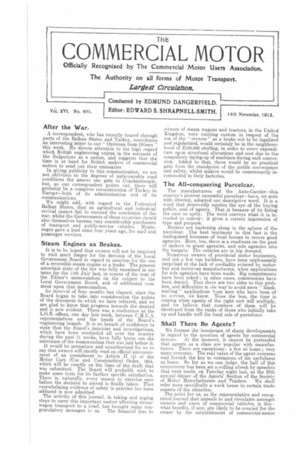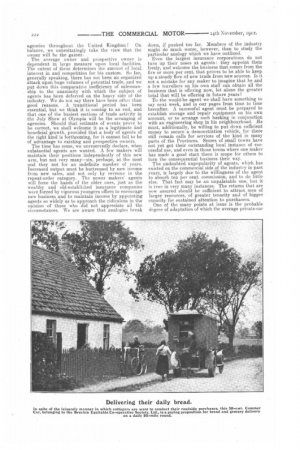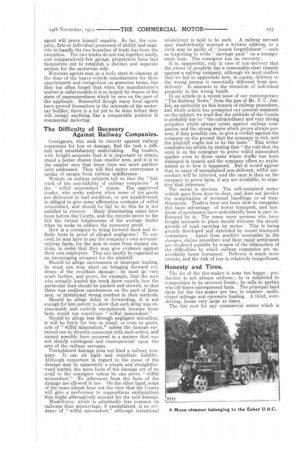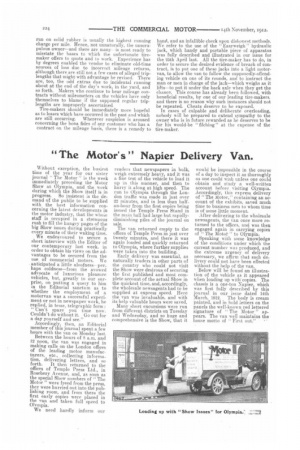After the War.
Page 1

Page 2

Page 3

Page 4

If you've noticed an error in this article please click here to report it so we can fix it.
A correspondent, who has recently toured through parts of the Balkan States and Turkey, contributes an interesting letter to our Opinions from Others" this week. He directs attention to the high regard which British engineering enjoys in the estimate of the Bulgarians as a nation, and suggests that the time is at hand for British makers of commercial motors to send out their emissaries.
In giving publicity to this communication, we are not oblivious to the degrees of unfavourable road conditions the nearer one gets to Constantinople, but, as our correspondent points out, there will probably be a complete reconstruction of Tuikey in Europe—both of its .administration and of its communications.
We might add, with regard to the Federated Balkan States, that an agricultural and inclusti ml revival cannot fail to succeed the conclusion of the war, whilst the Governments of those cciintries should also themselves become very considerable purchasers of transport and public-service vehicles. Montenegro gave a lead some four years ago, for mail and passenger services.
Stearn Engines as Brakes.
It is to be hoped that owners will not be required to wait much longer for the decision of the Local Government Board in regard to sanction for the use of a reversible steam engine as a brake. The present uncertain state of the law was fully examined in our issue for the 11th July last, in course of the text of the Editor's memorandum on the subject. to the Local Government Board, and of additional comment upon that memorandum. An interval of four months has elapsed, since the Board began to take into consideration the points of the document to which we have referred, and we are glad to know that progress towards the desired end is noW evident.. There was a conference at. the L.G.B. offices, one day last week, between C.M.U.A. representatives and the heads of the Board's engineering branch. It is no breach of confidence to state that the Board's inquiries and investigations, which have been conducted all over the country during the past II weeks, have fully borne out the substance of the memorandum that was laid before it.
It would be premature and unauthorized for us to say that owners will shortly read an official announcement of an. amendment to Article H (4) of the Motor Cars (Use and Construction) Order, 1904, which will be exactly on the lines of the draft that was submitted. The Board will probably wish to make some tests for its further specific satisfaction. There is. naturally, every reason to exercise care before the decision to amend is finally taken. That overwhelming evidence of safety in practice has been adduced is now admitted.
The activity of this journal, in taking and urging steps to carry this important matter affecting steamwagon transport to a head, has brought many congratulatory messages to us. The financial loss to owners of steam wagons and tractors, in the United Kingdom, were existing custom in respect of the use of the " reverse " as a brake not to be legalized and regularized, would certainly be in the neighbourhood of 2100,000 sterling, in order to cover expenditure upon structural alterations and ,cost due to the. compulsory laying-up of machines during such conversion. Added tothat, there would be no practical. gain from the standpoint of the public convenience and safety, whilst makers would be unnecessarily incommoded in their factories.
The All-conquering Parcelcar.
The manufacturers of the Auto-Carrier—this. country's pioneer successful parcelcar—have, we note with interest, adopted our descriptive word. It is a word that deservedly catches the eye of the buying: public, and of agents. That. is because of its fittingthe case so aptly. The word conveys what it is in-tended to convey: it gives a correct impression of type and purpose.
Matters are hastening along in the sphere of the. parcelcar. The best testimony to this fact is the. undisguised keenness of local houses to secure good agencies. Here, too, there is a readiness on the part of makers to grant agencies, and sole agencies into. the bargain. The vehicles are in big demand. Numerous owners of provincial motor businesses, and not a few van builders, have been unpleasantlysurprised at the lack of cordiality evinced by motorbus and motorvan manufacturers, when applications. for sole agencies have been made. Big commitments have been asked ; in other cases, commissions have been denied. That there are two sides to this problem, and difficulties in the way to avoid mere " blackmailing" applications from men who have been of no service, we know. None the less, the time is coining when agents of the right sort will multiply, and we believe that numbers of them will be developed from the ranks of those who initially take up and handle well the local sale of parcelcars.
Shall There Be Agents?
We foresee the imminence of sharp developments. in regard to the question of agents for commercial motors. At the moment, it cannot be pretended that agents as a class are popular with manufacturers. There are exceptions: a few at home ; very many overseas. The real value of the agent overseas may furnish the key to extensions of his usefulness at home. So far as we can judge, the ball of this. controversy has been set a-rolling afresh by speeches that were made, on Tuesday night last, at the fifth annual dinner of the Agents' Section of the Society of Motes Manufacturers and Traders. We shall refer more specifically a week hence to certain trade aspects of the situation. The point for us, as the representative and recognized journal that appeals to and circulates amongst owners and users of commercial vehichee, is this: what benefits, if any. are likely to be created for theowner by the establishment of commercial-motor agencies throughout the United Kingdom? On balance, we unhesitatingly take the view that the owner will be the gainer. The average owner and prospective owner is dependent in large measure upon local facilities. The extent of these determines the amoulit of local interest in and competition for his custom. So far, generally speaking, there has not been an organized attack upon huge volumes of potential trade, and we put down this comparative inefficiency of salesmanship to the unanimity with which the subject of agents has been deferred on the heavy side of the industry. We do not say there have been othor than good reasons. A transitional period has been essential, but we think it is coming to an end, and that one of the busiest sections of trade activity in the July Show at Olympia will be the arranging of agencies. Should that estimate of events prove to be correct, we shall welcome it as a legitimate ind beneficial growth, provided that a body of agents of the right kind is forthcoming, for it cannot fail to be of advantage to existing and prospective owners. The time has come, we unreservedly declare, when substantial agents are wanted. A few makers will maintain their positions independently of this new arm, but not very many—six, perhaps, at the most and they not for an indefinite number of years. Increased output must be buttressed by new income from new sales, and not only by revenue in the repeat-order category. The newer makers' agents will force the hands of the older ones, just as the wealthy and old-established insurance companies were forced by vigorous youngers offices to encourage new business and to maintain income by appointing agents so widely as to approach the ridiculous in the opinion of those who did not appreciate all the circumstances. We are aware that analogies break down, if pushed too far. Members of the industry might do much worse, however, than to study the particular analogy which we have outlined.
Even the largest insurance corporations do not turn up their noses at agents : they appoint them freely, and welcome the business that comes from the five or more per cent, that proves to be able to keep up a steady flow of new trade from new sources. Is it not a mistake for any maker to imagine that he and a few travellers on his own staff can obtain all the business that is offering now, let alone the greater total that will be offering in future years?
To the would-be agent we shall have something to say next week, and in our pages from time to time hereafter. A successful agent must be prepared to establish storage and repair equipment on his own account, or to arrange such backing in conjunction with an engineering shop in his neighbourhood. He must, additionally, be willing to put down sufficient money to secure a demonstration vehicle, for there still remain calls for services of the kind in many parts of the Provinces Scores of small towns have not yet got their outstanding local instance of successful use, and even in those towns where one maker has made a good start there is scope for others to turn the consequential business their way.
The undoubted unpopularity of agents, which has existed on the commercial side of the industry in past years, is largely due to the willingness of the agent to absorb ten per cent. commission, and to do little else. That fact may be an unpalatable one, but it. is true in very many instances. The returns that are now assured should be sufficient to attract men of larger resources, of greater tenacity and of bigger capacity for sustained attention to purchasers.
One of the many points at issue is the probable degree of adaptation of which the average private-car agent will prove himself capable. So far, the corn pany, firm or individual possessed of ability and capacity to handle the two branches of trade has been the exception. The two trades do not run together easily, and comparatively-few garage proprietors have laid themselves out to establish a distinct and separate section for the motorvan side.
Motorcar agents may as a body start to clamour at the door of the heavy-vehicle manufacturer for their appointment and recognition on generous terms, but they too often forget that when the manufacturer's answer is unfavourable it is so largely by reason of the state of unpreparedness which he sees on the part of the applicant. Successful though many local agents have proved themselves in the interests of the motorcar builder, there is a lot yet to be done before they will occupy anything like a comparable position in commercial motoring.
The Difficulty of Recovery Against Railway Companies.
Consignors, who seek to recover against railway companies for loss or damage, find the task a difficult and unsatisfactory undertaking. Big traders, with freight accounts that it is important to retain, stand a better chance than smaller men, and it is to the smaller men that these lines are more particularly addressed. They will find motor conveyance a means of escape from railway indifference Writers on railway subjects tell us that the "bulwark of the non-liability of railway companies" is the " wilful misconduct" clause. The aggrieved trader, who seeks redress when some of his goods are delivered in bad oondition, or are misdelivered, is obliged to give some affirmative evidence of wilful misconduct, and should he fail to do this he is not entitled to recover. Many illuminating cases have been before the Courts, and the records prove to the hilt the virtual helplessness of the average trader when he seeks to adduce the necessary proof.
How is a consignor to bring forward hard and definite facts in proof of alleged negligence? To succeed, he may have to pay the company's own servants' railway fares, for the men to come from distant stations, in order that they may give evidence against their own employers. That can hardly be regarded as an encouraging prospect for the plaintiff. Should he allege carelessness gar improper loading, he must not stop short on bringing forward evidence of the resultant damage: he must go very much farther, and prove, for example, that the men who actually loaded the truck knew exactly how the particular load should be packed and stowed, or that there was reckless carelessness on the part of these men, or intentional wrong conduct in their methods.
Should he allege delay in forwarding, it is not enough for him merely to show that such delay was unreasonable and entirely unexplained, because those facts would not constitute " wilful misconduct."
Should he allege loss through negligent unloading, it will be futile for him to plead, or even to prove, acts of "wilful misconduct," unless the damage sus. tained can be directly connected with such action, and cannot possibly have occurred in a manner that was not clearly contingent and consequential upon the acts of the railway servants.
Unexplained damage does not bind a railway company. It can sit tight and repudiate liability. Although conjecture in regard to the cause of the damage may be apparently a simple and straightforward matter, the mere facts of the damage are of no avail to the consignor unless he can prove "wilful misconduct." No inferences from the facts of the damage are allowed in lawOn the other hand. some of the cases almost bear out the view that the Courts will give a preference to suppositious explanations that might alternatively account for the said damage.
Misdelivery. which is admittedly less common on railwaye than miscarriage, if unexplained, is no evidence of "wilful misconduct," although intentional
rnisdelivery is held to be such. A railway servant may inadvertently misread a written address, or a clerk may be guilty of " honest forgetfulness "—such as forgetting to write ." carriage paid" on a consignment. note. The consignor has no recovery.
It is, apparently, only in case of non-dePvery that the owner of property has a, reasonably-clear remedy against a railway company, although we must confess that we fail to appreciate how, in equity, delivery to the wrong person is essentially different from nondelivery. It amounts to the retention of individual property in the wrong hands.
In an article in a recent issue of our contemporary "The Railway News," from the pen of Mr. F. C. Jenkin, an authority on this branch of railway procedure, and which article has prompted our present comment on the subject, we read that the attitude of the Courts is probably due to "the extraordinary and vary strong prejudice which always exists against railway companies, and the strong desire which jurors always possess, if they possibly can, to give a verdict against the company on the ground that the company is rich, and the plaintiff ought not to be the loser." This writer concludes his article by stating that "the rule that the onus is on the consignor to prove wilful misconduct applies even to those cases where traffic has been damaged in transit and the company offers no explanation as to how it happened. But it would appear that in cases of unexplained non-delivery, wilful misconduct will be inferred, and the onus is then on the company to prove facts, if any are available, to negative that inference."
The moral is obvious. The self-contained motor vehicle goes from door to door, and does not involve the eomplexities of terminal handlings or of transhipments. Traders have not been slow to recognize this basic advantage of motor transport, and hundreds of purchasers have undoubtedly been in part influenced by it. The many more persons who have freight accounts to place should welcome the steady growth of road carrying by motor. This is being greatly developed and extended by sound transport companies. Apart from positive economies in the charges, claims procedure and their rapid settlement are rendered possible by reason of the elimination of the difficulties by which railway companies are unavoidably beset hereanent. Delivery is much more certain, and the risk of loss is relatively insignificant.
Honesty and Tires.
The lot of the tire-maker is none too happy : production is not always uniform ; he is subjected to competition in its severest forms ; he sells to parties who oft-times misrepresent facts. The principal hard facts for the tire-maker are two in number—undisclosed mileage and excessive loading. A third, overdriving, looms very large at times. The tire cost for any commercial motor which is run on solid rubber is usually the highest running charge per mile. Hence, not. unnaturally, the unscrupulous owner—and there are manyis most ready to misstate the bases to which the unfortunate tiremaker offers to quote and to work. Experience has by degrees enabled the vendor to eliminate old-time sources of loss due to incorrect mileage returns, although there are still not a few cases of alleged triplengths that might with advantage be revised. There are, too, the odd extras due to incidental running about at the end of the day's work, in the yard, and so forth. Makers who continue to bear mileage contracts without mileometers on the vehicles have only themselves to blame if the supposed regular trip. lengths are improperly ascertained Tire-makers should be immediately more hopeful as to losses which have occurred in the past and which are still occurring. Wherever suspicion is aroused concerning the bona fides of any customer who has a contract on the mileage basis, there is a remedy to hand, and an infallible check upon dishonest methods. We refer to the use of the " Easyweigh " hydraulic jack, which handy and portable piece of apparatus was fully described and illustrated in our issue for the 2ath April last. All the tire-maker has to do, in order to secure the desired evidence of breach of contract, is to put one of these jacks into a light motorvan, to allow the van to follow the supposedly-offending vehicle on one of its rounds, and to instruct the man or men in charge of the jack—which weighs as it lifts—to put it under the back axle when they get the chance. This course has already been followed, with beneficial results, by one of our leading tire-makers, and there is no reason why such instances should not be repeated. Cheats deserve to be exposed. In eases of culpable and deliberate overloading, nobody will be prepared to extend sympathy to the owner who is in future rewarded as he deserves to be for his would-be " filching " at the expense of the tire-maker.
























